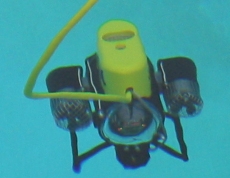
|
|||
Bay Mini-Grant Introduces Middle Schoolers to Underwater TechnologyHow do you teach kids about Tampa Bay when they're more interested in video games than the environment? |
|||
|
If you're Erica Moulton, program biologist at Hillsborough Community College, you show them how to build underwater remotely operated vehicles that give them a whole new perspective on the world. "We see a lot of kids who aren't particularly interested in the environment, but they're big into technology," says Moulton who works with students ranging from fourth grade to high school in HCC's environmental studies department. "They like Legos, building models, robots and video games, so this is a way to sneak in learning when they don't know you're doing it." A $2,755 Bay Mini-Grant from the Tampa Bay Estuary Program allowed Moulton to purchase 20 "ROVs in a Bag" as the first step toward introducing advanced underwater technology to students beginning as early as the fourth and fifth grade. "It's something they can put together in a couple of hours, then we'll create some kind of competition in swimming pools so they can learn how technology and the environment tie together." Even in swimming pools, design and engineering make a significant difference in ROV performance, she adds. "There are a lot of issues, like flotation, that are different underwater," she adds. Moulton also has built a larger ROV with a built-in video camera that can be used at HCC's Cockroach Bay nature center. "Schools or students who can come out to Cockroach Bay three or four times can build their own ROV and explore the bay," she said. "Or, we can drop one that's already been built off the boat so students can see what the sea floor looks like and what the larger ROVs can do." As interest in the technology grows, Moulton hopes to lead a team of high school and community college students in next year's national ROV competition sponsored by the Marine Advanced Technology Education Center in California. "Last year, they held it at NASA and the Discovery Channel taped the competition. They had teams from all over the U.S. and Canada retrieving objects from the bottom of swimming pools. The diversification was neat - they had everything from scoops to hooks and other methods of capturing the objects." Students don't need to attend any particular school to be part of the team, but there will be regular meetings prior to the event to build and test the ROV. Underwater experience is helpful but not necessary, Moulton said. "I've been through several workshops on how to build and use the technology, but the kids are better at operating the ROV than I am. They're not necessarily gifted students - the best ROV pilots are the ones who spend hours playing video games." Funded through the sales of Tampa Bay Estuary auto license plates, Bay Mini-Grants are awarded to non-profit organizations, schools, civic associations and other community groups for environmental restoration and education projects. Approximately $90,000 has been targeted toward Mini-Grants in 2002-2003. Grant applications are available at www.tbep.org and are due every year by October 15.
Now Showing:
|
|||
